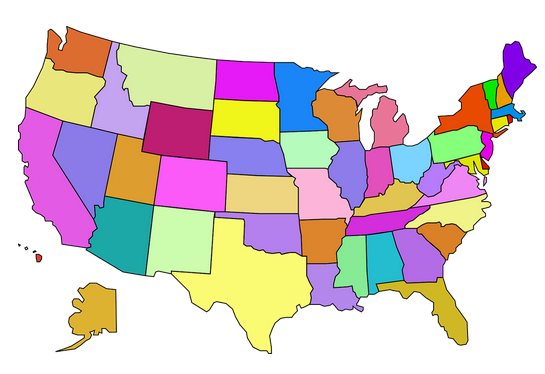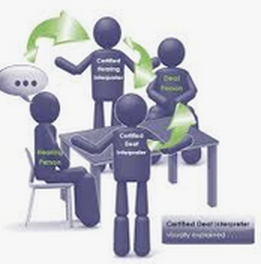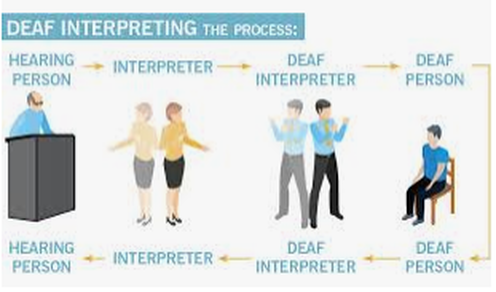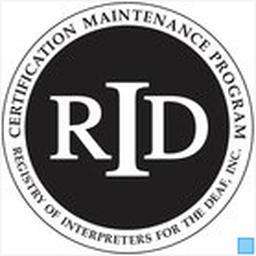The Deaf Interpreting profession
What is Deaf interpreting?
Deaf Interpreting is a challenging and rewarding career. It requires in-depth skill development and natural communication expertise in both English and ASL, a passion for lifelong learning, and a desire to support Deaf people having full interaction and communication access to any and all life experiences.
As a Deaf person, you carry a lifetime of cultural, linguistic and formative experiences from being Deaf. Your lifelong experiences with the Deaf community and comfort level in using visual language and navigating communication challenges gives you unique advantages in providing best communication access for Deaf people. Most Deaf interpreters share the common experience of being 'natural' interpreters while growing up, helping their peers filter and understand information in both English and ASL. Deaf Interpreters build up on this 'natural' skill with intense training in areas of discourse analysis, linguistics, process of interpreting, interaction management, cultural mediation and ethical principles. Experienced Deaf Interpreters work toward and obtain state and national certifications, maintain their knowledge of best practices in interpreting, and seek out specialized training in focus areas.
As a Deaf person, you carry a lifetime of cultural, linguistic and formative experiences from being Deaf. Your lifelong experiences with the Deaf community and comfort level in using visual language and navigating communication challenges gives you unique advantages in providing best communication access for Deaf people. Most Deaf interpreters share the common experience of being 'natural' interpreters while growing up, helping their peers filter and understand information in both English and ASL. Deaf Interpreters build up on this 'natural' skill with intense training in areas of discourse analysis, linguistics, process of interpreting, interaction management, cultural mediation and ethical principles. Experienced Deaf Interpreters work toward and obtain state and national certifications, maintain their knowledge of best practices in interpreting, and seek out specialized training in focus areas.
|
Deaf interpreters bring their expertise in navigating communication dynamics in situations involving d/Deaf people from different backgrounds and with different communication barriers. Deaf-hearing interpreting teams work together in different specialized situations in one-on-one appointments or during group meetings with DeafBlind consumers or Deaf consumers with atypical language. Deaf Interpreters can specialize in supporting specific consumers or develop expertise in interpreting provision at conferences, entertainment or in education, medical, mental health, or legal settings. Deaf interpreters often do English-to-ASL translation work in-person or through creation of videos. There has been a recent surge in Deaf-hearing interpreter teams covering press conferences to ensure critical information is accessible to all d/Deaf citizens.
All professional interpreters follow a professional Code of Conduct agreed on between the National Association of the Deaf and the National Registry of Interpreters for the Deaf. One of its most important components is to maintain confidentiality. This means keeping private whatever happens in the interactions that are interpreted. Interpreters work in a variety of settings such as:
|
The Registry of Interpreters for the Deaf
|
The Registry of Interpreters for the Deaf (RID) is the professional organization for ASL-English interpreters. They have established national standards for quality assurance of services by providing certification for interpreters, including Deaf interpreters. They have also developed ethical guidelines for interpreters, the Code of Professional Conduct (CPC). Learn more about RID: www.rid.org.
Part of the Code of Professional Conduct is continuing education and development of interpreting skill, and RID provides a professional development conference every two years. |
National Deaf Interpreters
|
|
National Deaf Interpreter organization is a non-profit professional organization for Deaf interpreters collaborating to support best practices in Deaf Interpreting. NDI hosts biennial conferences for Deaf interpreters with workshops, panels, and specialized trainings. Website: http://www.nationaldi.org
|
State certification requirements

Each state has their own requirements for interpreters to be able to work professionally. Don't know your state requirements? RID has provided information on each state. Visit their website to find out: http://rid.org/advocacy-overview/state-information-and-advocacy/.
This page also lists local interpreting associations, Deaf associations and other important organizations for interpreters in each state.
State Quality Assurance Exams. Many states offer a certification other than the RID certification test. They may have developed their own certification exam, or use the Texas-developed Board for Evaluation of Interpreters exam, known as the BEI.
Possible work requirements
Depending on the setting in which you choose to work as an interpreter, there may be restrictions other than certification that you should be aware of. Some employers such as elementary and secondary schools or video remote interpreting may require:
- background checks
- drug screenings
- covering visible tattoos
- removing any visible piercings other than earrings
- specific dress code, including hairstyle





